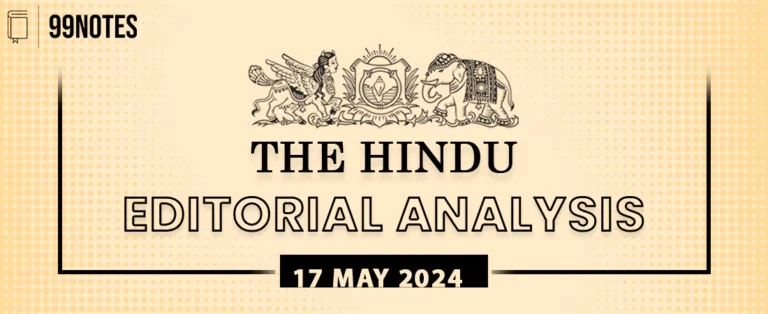14 June 2023 : The Hindu Editorial
The Hindu Editorial
14-June-2023
Daily Current Affairs For UPSC ,The Hindu Editorial Summary
1. Tax law in the shadow of the higher judiciary
Topic: GS2 – Indian polity.
Context:
-
-
-
The article discusses about taxation laws in India and the role of the Supreme Court in interpreting and applying those laws.
-
The article highlights two specific judgments by the Supreme Court that are seen as deviating from the principles of legality and certainty in taxation.
-
-
Issue:
-
-
-
India’s taxation law is based on the principles of legality and certainty, requiring taxes to be imposed only with the authority of law and to be clear, consistent, and predictable.
-
However, there have been instances where the Supreme Court of India has undermined these principles by reversing well-reasoned judgments of High Courts and enacting taxes without legislative support.
-
One example is the case of ITO vs Vikram Sujitkumar Bhatia, where the Supreme Court reversed a High Court verdict regarding the retrospective effect of an amendment to the Income Tax Act. The Supreme Court’s reasoning in this case is questionable, as it acted as a maker of the law rather than an interpreter.
-
Another example is the case of Union of India vs Ashish Agarwal, where the Supreme Court revived notices of reassessment issued by the Revenue without legal sanction. The Court not only reversed the judgments of several High Courts but also invoked Article 142 of the Constitution to pass orders in breach of statutory law.
-
These actions by the Supreme Court encroach on legislative functions and undermine the rule of law, as taxation should only be carried out through proper legislation.
-
The Court’s willingness to assume legislative powers raises concerns about the promise of taxation based on legality and the rule of law.
-
-
2.Musings on the frictions in India-Canada ties
Topic: GS2 – International relations.
Context:
-
-
-
The article discusses the recent incident in Brampton, Canada, where a pro-Khalistani parade featured a controversial tableau depicting the assassination of former Indian Prime Minister Indira Gandhi.
-
-
Issue:
-
-
-
The Indian External Affairs Minister, S. Jaishankar, indirectly criticized Canada’s tolerance towards separatists and extremists during a media conference, without specifically mentioning the offensive float.
-
The article emphasizes the need to address the glorification of violence against an Indian Prime Minister, regardless of political controversies or past events such as the anti-Sikh 1984 riots.
-
It highlights the role of the ethnic Indian community, including Sikhs, in Canadian public life and the political considerations that influence Canada’s stance on certain issues.
-
The article also mentions the increasing importance of the Indian diaspora in foreign policy and the trend of Indian politicians engaging with the diaspora for domestic and international purposes.
-
It addresses the remarks made by Canada’s National Security and Intelligence Adviser, Jody Thomas, mentioning India as a state actor in terms of foreign interference, which the Indian External Affairs Minister dismissed as baseless.
-
The article notes the critical dependence of Canadian Prime Minister Justin Trudeau on the New Democratic Party (NDP), whose leader, Jagmeet Singh, is a supporter of Khalistan.
-
Despite the current challenges in bilateral ties, cooperation in various areas, including the Cannabis medicine project, continues between India and Canada.
-
-
3. Where anyone can be accused of sedition
Topic: GS2 – Indian polity.
Context:
-
-
-
The article discusses the current state of the debate on sedition in India and criticizes the recommendations made by the 279th Law Commission Report.
-
-
Issue:
-
-
-
The Commission suggests amending Section 124A of the Indian Penal Code to incorporate the meaning of sedition as defined by the Supreme Court in the Kedar Nath Singh case in 1962, increasing the minimum sentence, and requiring a preliminary enquiry before registering a First Information Report (FIR) in sedition cases.
-
It is being argued that the proposed amendment focusing on the “tendency to incite violence” does not address the source of criminality and that sedition remains an offense targeting political speech against the government.
-
The use of the “tendency” jurisprudence is criticized for its ambiguity and lack of clarity, which can lead to the inclusion of expressions that are not directly linked to public disorder.
-
Concerns have been raised about the wide net that the proposed amendment would cast and the potential for abuse of police power in determining acts with the “mere inclination to violence.”
-
The Commission is accused of ignoring developments in other countries that have invalidated sedition laws and disregarding the ground realities in India, including the large number of sedition cases filed against individuals for criticism of the government.
-
The retention of sedition is seen as sending a message to police officers to decide on the inclination to incite violence without an actual threat, making anyone a potential seditionist and subjecting them to social stigma, lengthy trials, and increased punishment.
-
The article criticizes the Commission’s justification of sedition based on continuities from colonial times and argues that sedition creates a relationship of suppression and precludes accountability and the right to question in a post-colonial democracy.
-
-
4. Ethnicisation and poor governance are stumbling blocks to peace in Manipur
Topic: GS2 – Indian polity.
Context:
-
-
-
In the absence of proper governance machinery and without addressing the ethnic issues – achievement of peace in Manipur is a big challenge.
-
-
Issue:
-
-
-
After a conflict, a return to normalcy is necessary to address grievances and prevent future conflicts.
-
Peace talks between representatives from civil society and political parties are crucial to achieve the first step of normalcy.
-
The presence of paramilitary forces and appeals for peace by Union Home Minister Amit Shah have helped reduce violence, but progress in terms of peace conditions and the return of displaced people has been limited.
-
The constitution of a peace committee by the Union government in Manipur has faced challenges, with some public figures refusing to join or expressing dissatisfaction with their inclusion without prior consultation.
-
The withdrawal of representatives from the committee reveals ethnic divisions within Manipur’s civil society and complicates peace-building efforts.
-
The government should continue to persuade prominent representatives from various groups to engage in dialogue.
-
The need for the Union government’s involvement highlights the Biren Singh administration’s failure to retain the confidence of all parties.
-
It may be time for the Union government to consider alternative leadership in order to facilitate the peace-building process.
-
-
For Enquiry

14 June 2023 : The Hindu Editorial

14 June 2023 : Daily Current Affairs

13 June 2023 : PIB

13 June 2023 : The Hindu Editorial

13 June 2023 : Daily Current Affairs

12 June 2023 : PIB

12 June 2023 : The Hindu Editorial

12 June 2023 : Daily Current Affairs

10 June 2023 : PIB

10 June 2023 : The Hindu Editorial
The Hindu 14 June 2023 : The Hindu Editorial The Hindu Editorial
14-June-2023
Daily Current Affairs For UPSC ,The Hindu Editorial Summary
Facebook-f
Twitter
Youtube
1….
Daily Current Affairs 14 June 2023 : Daily Current Affairs DAILY CURRENT AFFAIRS
14-June-2023
Daily Current Affairs For UPSC ,Daily Current affairs of The hIndu…
PIB 13 June 2023 : PIB PRESS INFORMATION BUREAU
13-June-2023
Daily Current Affairs For UPSC ,The PIB ( Press Information Bureau…
The Hindu 13 June 2023 : The Hindu Editorial The Hindu Editorial
13-June-2023
Daily Current Affairs For UPSC ,The Hindu Editorial Summary
Facebook-f
Twitter
Youtube
1….
Daily Current Affairs 13 June 2023 : Daily Current Affairs DAILY CURRENT AFFAIRS
13-June-2023
Daily Current Affairs For UPSC ,Daily Current affairs of The hIndu…
PIB 12 June 2023 : PIB PRESS INFORMATION BUREAU
12-June-2023
Daily Current Affairs For UPSC ,The PIB ( Press Information Bureau…
The Hindu 12 June 2023 : The Hindu Editorial The Hindu Editorial
12-June-2023
Daily Current Affairs For UPSC ,The Hindu Editorial Summary
Facebook-f
Twitter
Youtube
1.Manipur,…
Daily Current Affairs 12 June 2023 : Daily Current Affairs DAILY CURRENT AFFAIRS
12-June-2023
Daily Current Affairs For UPSC ,Daily Current affairs of The hIndu…
PIB 10 June 2023 : PIB PRESS INFORMATION BUREAU
10-June-2023
Daily Current Affairs For UPSC ,The PIB ( Press Information Bureau…
The Hindu 10 June 2023 : The Hindu Editorial The Hindu Editorial
10-June-2023
Daily Current Affairs For UPSC ,The Hindu Editorial Summary
Facebook-f
Twitter
Youtube
1….



